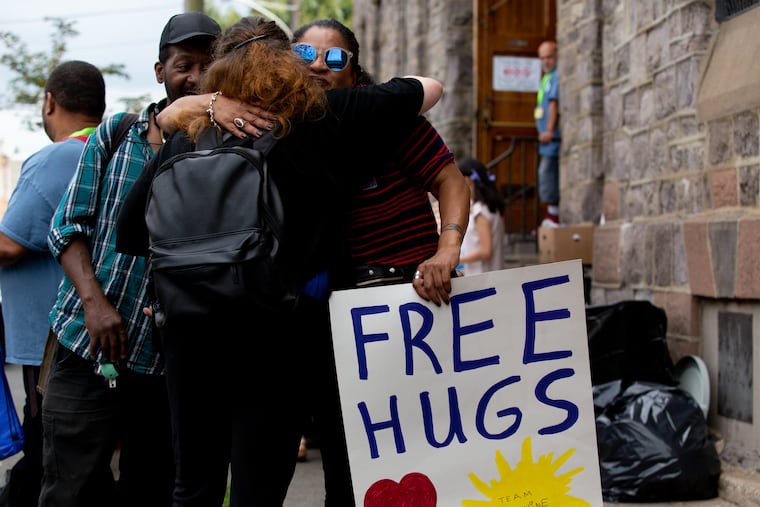Philadelphia’s only needle exchange reaches out to the community with burgers, vaccines, and naloxone
In attendance at the fair was a mix of permanent residents, people who come to Kensington to use drugs and people living rough on the streets there.

Joanne Leon went to the community fair outside Prevention Point on Wednesday because she wanted to save lives.
Leon, whose house is around the corner from the Kensington-based public health organization’s office, has lived at what is now the epicenter of Philadelphia’s opioid crisis for four decades. In recent months, she’s stopped allowing her granddaughter to play outside their house on Ruth Street: The crowds of people injecting heroin on Kensington Avenue and on side streets just feet from their doorstep have become too much, she said, echoing a common concern in the neighborhood. “It’s escalated tremendously,” she said.
But she went to the fair because she cares about her neighbors in addiction, too — the people whom she sometimes finds unconscious and unresponsive on the streets near her house. Leon had heard one of the stalls at the fair was handing out naloxone — the overdose-reversal drug — and she wanted to start carrying it.
“I could save a life,” she said. “A lot of times, I see people, and I don’t know if they’re dead or not. I would use it for someone. It’s not their fault they’re addicted.”
Prevention Point — which opened 27 years ago in Kensington as a bare-bones needle exchange and has since expanded to provide health care, social services, addiction treatment, and housing — organized Wednesday’s fair as a way to build ties with neighbors and emphasize that its services are available for area residents as well.
A number of city social service agencies set up tables, grilled burgers and hot dogs, handed out pamphlets, and even dispensed hepatitis A vaccines. Kensington is experiencing an outbreak of the liver virus — people who use drugs or are living rough are particularly vulnerable — and the table ran out of vaccines in less than an hour.
“It’s nice to give people exposure to a large array of services that aren’t just based around our target population, but also folks in the community, living with needs we hope we can address,” said Clayton Ruley, Prevention Point’s director of community engagement and volunteer services.
In attendance at the fair was a mix of permanent residents, people who come to Kensington to use drugs, and people living on the streets there. A man who gave his name as Gage arrived from Camden with his fiancee; the two are enrolled in a methadone clinic but struggle with using illicit drugs. Both had been introduced to prescription pills as teenagers by their parents, they said.
Gage said his fiancee had recently tried to save him from an overdose, but with no naloxone on hand had to wait until paramedics showed up. “You hear all the time around here: ‘Does someone have [naloxone], can someone call 911,’” the woman, who gave her name as Sadie, said.
Elvis Rosado, Prevention Point’s coordinator of community engagement, noted that just a few minutes before the fair began at 2 p.m., outreach workers rushed down the block to reverse an overdose on the lawn of McPherson Square Library.
Even after nearly 30 years in operation, Prevention Point’s presence can be controversial in Kensington. Syringe exchanges are still technically illegal in Pennsylvania, though former Mayor Ed Rendell authorized them in Philadelphia in 1992. More recently, residents — including some who went to the fair — have raised concerns about the groups of people who, rousted from larger encampments in the area, have been sleeping on the street outside the exchange.
“It doesn’t matter if the camps have been cleared if there are still people on the streets,” Rosado said. “We still have a lot of work to do.”
A lawsuit over a proposed supervised injection site in the neighborhood is working its way through federal court, and Prevention Point’s executive director is also leading the nonprofit aiming to open a site. The agency has been held up as a model for the kind of services that could be offered at a site for people to use drugs under medical supervision and be revived if they overdose. Wednesday’s fair was unrelated to that push, Rosado said: Prevention Point and Safehouse, the nonprofit, are separate entities.
Although the site has faced fierce opposition from community groups, some neighbors, like Leon, said they’d embrace it if only to stop people from injecting outside.
Rosado said the event was as important for Prevention Point staffers as it was for community members.
“It’s a reminder we have a stake in the community,” he said. “We’re trying to be a neighbor and remind ourselves that we are neighbors.”